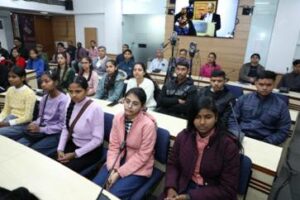News
64 Indian Students Travel to Japan for the Sakura Science High School Programme
Ceremony held at CIET-NCERT, the Secretary of the Department of School Education and Literacy (DoSE&L), Shri Sanjay Kumar, undertook the task of flagging off a group of 64 eager and enthusiastic children. These young minds, hailing from Kendriya Vidyalayas (KVS) and Navodaya Vidyalaya Samiti (NVS) across 11 states in India—Assam, Bihar, Chhattisgarh, Gujarat, Karnataka, Madhya Pradesh, Punjab, Odisha, Ladakh, Uttar Pradesh, and Goa—have been invited by the Japan Science and Technology Agency (JST) to participate in the Sakura Science High School Programme 2023. The event, which took place on a day of significance at CIET-NCERT, was attended by Joint Secretary, DoSE&L, Smt. Archana Sharma Awasthi; Manager JST Japan, Mr. Kemmochi Yukio; Director, NCERT, Prof. Dinesh Prasad Saklani; and officials from DoSE&L, among others.
The Sakura Science High School Programme, a collaborative effort between JST and the Department of School Education and Literacy, Ministry of Education, has been fostering intellectual growth and a passion for scientific exploration among young learners since 2014. As part of the Sakura Science Programme (SSP), this initiative facilitates short-term visits to Japan for students, providing them with a unique opportunity to delve into Japan’s cutting-edge science and technology, as well as its rich culture.

India’s participation in the program dates back to April 2016, marking its introduction to this enlightening experience. Over the years, a total of 468 students, accompanied by 75 supervisors, have had the privilege of visiting Japan through this program. The most recent contingent, comprising 57 students, embarked on their journey to Japan in July 2023.
Aligned with the principles outlined in the National Education Policy (NEP) 2020, which underscores the significance of holistic, integrated, enjoyable, and engaging learning experiences, the Sakura Science High School Programme aligns with the policy’s vision. NEP 2020 advocates for experiential learning as the standard pedagogy across all stages of education and encourages explorations of relationships among different subjects. In this context, educational trips and excursions to places of historical, cultural, social, and technological importance play a pivotal role. Japan, being a developed nation and a friendly ally, with its technological advancements, stands out as a preferred destination for educational exposure. Visiting a country like Japan, with its rich tapestry of innovative practices, offers a valuable opportunity for students to broaden their intellectual horizons.